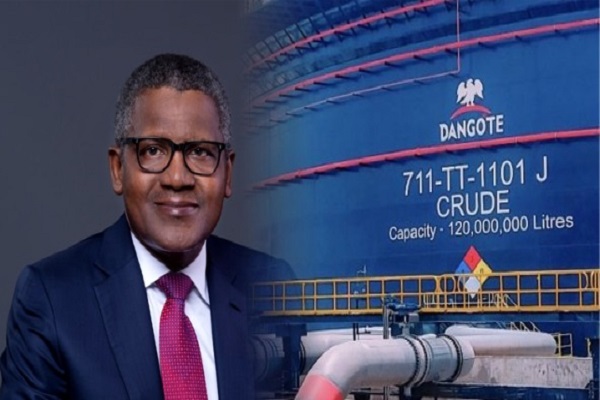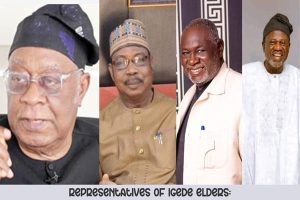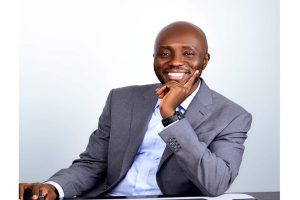
With the politically charged activities of the 2023 election year in Nigeria now history, it is not surprising that 2024 has been largely quiet on the political front. Save for the off-season governorship elections in Edo and Ondo states, most of the events that made the big headlines in the outgoing year were business, economic, social and disaster.
1. The tragic death of Herbert Wigwe & Co in a US helicopter crash
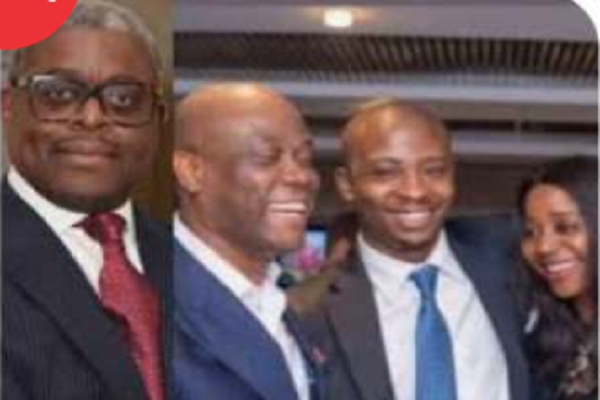
The first biggest event of national magnitude that ushered in 2024 in Nigeria came in early February with the tragic helicopter crash in California, USA, that killed the banking guru, Herbert Wigwe, his wife, son and three others.
The chartered helicopter was on its way from from Palm Springs to Boulder City in Nevada when it went down about 96km (60 miles) from Las Vegas.
The 57-year-old celebrity son of a the former NTA Director General, Shyngle Wigwe; co-founder of Access Bank and CEO of Access Holdings, was on his way to Las Vegas to attend American Football’s Super Bowl.
The crash which occurred near Nipton, on the edge of the Mojave Desert Preserve, was attributed to poor weather.
The tragic death of the multi-billionnaire financier of Living Faith Church threw Nigerian banking industry, the pentecostal Christian Community and the celebrity circuit into deep and prolonged mourning. President Tinubu described Wigwe’s death as “shocking beyond comprehension… a terrible blow” for Nigeria and Africa’s banking industry.
Wigwe’s lavish and carnival-like funeral was befitting of a celebrity billionaire.
2. CBN’s announcement of new minimum capital requirements for Banks in Nigeria

Nigeria’s banking industry was yet to recover from the shock of Herbert Wigwe’s tragic death when it slammed with another shock – regulatory shock. The Central Bank of Nigeria (CBN), in late March, announced new minimum capital requirements for different categories of banks operating in the country.
The minimum capital base for commercial banks with international authorisation is N500bn. That for commercial banks with national authorisation would be N200bn, while the new requirement for those with regional authorization is N50bn. For merchant banks the new minimum capital would be N50 bn, while the new requirements for non-interest banks with national and regional authorisations are N20 bn and N10 bn, respectively.
A circular signed by the Director for Financial Policy and Regulation, Mr. Haruna Mustafa, to all commercial, merchant, and non-interest banks and promoters of proposed banks emphasized that all banks are required to meet the minimum capital requirement within 24 months commencing from April 1, 2024, and terminating on March 31, 2026
According to the circular, the move was to enhance banks’ resilience, solvency, and capacity to continue supporting the growth of the Nigerian economy.
To enable them to meet the minimum capital requirements, the CBN urged banks to consider injecting fresh equity capital through private placements, rights issues and/or offers for subscriptions, Mergers and Acquisitions (M&As), and/or upgrades or downgrade of license authorisation.
Furthermore, the circular disclosed that the minimum capital shall comprise paid-up capital and share premium only. It stressed that the new capital requirement is not based on the Shareholders’ Fund.
“Additional Tier 1 (AT1) Capital shall not be eligible for meeting the new requirement. Notwithstanding the capital increase, banks must comply with the minimum capital adequacy ratio (CAR) requirement applicable to their license authorisation.
“In line with extant regulations, banks that breach the CAR requirement shall be required to inject fresh capital to regularise their position,” it added.
The CBN circular said the minimum capital requirement for proposed banks shall be paid-up capital, adding that the new minimum capital requirement shall apply to all new applications for banking licenses submitted after April 1, 2024. The CBN said it would continue to process all pending applications for banking licenses for which a capital deposit and/or an Approval-in-Principle (AIP) had been granted. However, it said that the promoters of such proposed banks would make up the difference between the capital deposited with the CBN and the new capital requirement no later than March 31, 2026.
The Nigeria banking regulator said all banks were required to submit an implementation plan (clearly indicating the chosen option(s) for meeting the new capital requirement and various activities involved with their timelines) not later than April 30, 2024. The CBN also disclosed that it would monitor and ensure compliance with the new requirements within the specified terms.
The new requirements could force the closure or merger/acquisition of the banks that cannot raise their capital to the new baseline, reminiscent of a similar 2005/2006 recapitalization that saw the death of many banks.
3. Air Peace First Flight to London

For the Nigerian aviation industry, especially international air travellers, one of the biggest news of 2024 came via the Air Peace Inaugural Lagos-London flight on Saturday, March 30. The flight from Lagos to London on Saturday, March 30, 2024, with 260 passengers marked the resumption of flights by an indigenous carrier to one of the most lucrative routes from the country since 2019.
The airline, which operated a 274-seat capacity Boeing 777 for the maiden flight, held a brief ceremony at the Muhammed International Airport (New Terminal) to celebrate the occasion.
This maiden flight came four months after Air Peace’s Chairman and Chief Executive Officer, Allen Onyema, announced that the airline had successfully obtained the Foreign Carrier Operator Permit and Third Country Operator Permit which qualified it to operate flights to Europe and the UK. It marked the first time in the last seven years since a Nigerian airline reactivated the famous Lagos-London route. Med-View Airline became the last indigenous carrier to operate on the route in 2017.
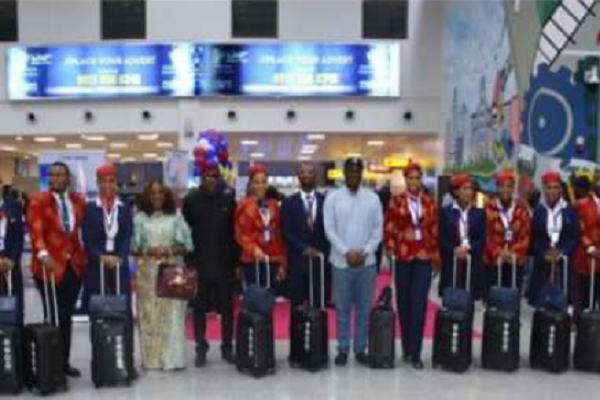
The Aviation Minister Festus Keyamo said the commencement of Lagos-London flights by Air Peace would reduce foreign exchange demand by Nigerians and ease the pressure on the exchange rate. The minister promised that the Federal Government would continue to protect the airline and other Nigerian carriers that might want to operate international service. He disclosed that the start of the route by the airline had also compelled some mega carriers on the Lagos-London route to drop fares.

The Minister of Industry, Trade and Investment, Doris Uzoka-Anite, described the feat by Air Peace as the convergence of innovation, determination, and the unwavering commitment to excellence.
She said: “Nigeria has needed a local airline flying directly to the UK for a number of years. Air Peace proudly wears the badge of Made-in-Nigeria. It is a symbol of our collective effort to showcase our capabilities to the world. From the skilled hands that maintain the aircraft to the warm smiles of the cabin crew, every aspect of Air Peace reflects the spirit of our nation.
“Let us reflect on the economic impact of this flight. Air Peace’s presence in London is not merely about arrivals and departures; it is about trade, investment, and collaboration.”
“This means so much to us and reaffirms our trail-blazing status as a leading airline out of Africa,” Air Peace said in a statement.
Many of the passengers on the flight said the resumption of direct Lagos-London route by a Nigerian airline was long awaited and signaled a new dawn in the travel industry in Nigeria. “It’s a new dawn for travellers. We are tired of exploitative fares charged by foreign carriers. Air Peace is changing the narrative to air travel with this maiden flight.
“We see that fares are gradually reducing since Air Peace announced flight to London. This is good for air travel and Nigeria,” Tony Ike, a passenger on the flight said.
4. Presidential flag-off of the construction of Lagos-Calabar coastal highway
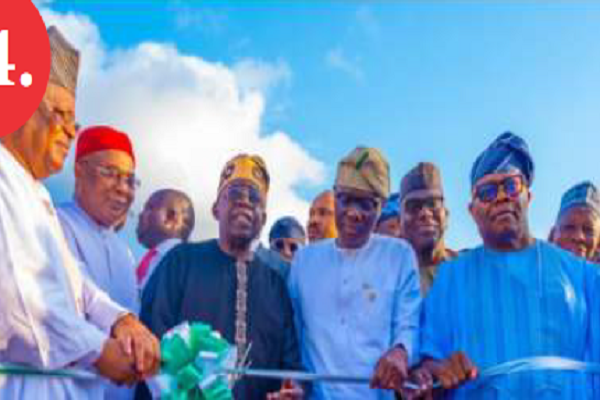
Another big news event for travellers – road travellers this time – in 2024 came in late May when President Bola Tinubu flagged off the 700 kilometre Lagos-Calabar Coastal highway.
The ceremony took place in Victoria Island, Lagos, on Sunday 26. The event was significant because of the ambitious and humongous nature of the project – a single road contract stretchier 700 kilometres and cutting across three geopolitical zones of the country – Southwest Southeast and South-South. It was almost incredulous.
At the flag-off ceremony, the president was flanked by Senate President Godswill Akpabio, Dave Umahi, minister of work as well as Governors of some of the states covered by the road. They included Babajide Sanwo-Olu, Lagos Governor; Hope Uzodinma, Imo Governor; and Dapo Abiodun, Ogun Governor.
The construction of the highway began in March. The first phase of the project, made up of 47.47 kilometres of dual carriageway, was awarded to Hitech Construction Company Ltd.
The project has generated a lot of controversies from the demolitions of structures in the beach and the allegations of lack of transparency in the award and project cost.
Speaking earlier on Thursday during the 3rd stakeholders’ meeting, Umahi said the federal government would revert to the gazetted route within some kilometres of the Lagos-Calabar coastal highway project to save submarine cables.
5. Davido, Chioma’s fairytale wedding

One of the biggest events of 2024 on the Nigerian social circuit was the celebrity wedding between music star, David Adeleke, aka Davido, and his long-term partner, Chioma Rowland, at Victoria Island, Lagos, on June 25.
In spite of the relentless rain on the day and traffic gridlock on the roads leading to the venue, Harbour Point Event Centre, the wedding lived up to its billing as a celebrity event.
Dignitaries, including past and serving political leaders across the country, traditional rulers as well as showbiz and sporting buffs graced the occasion. They included former President Olusegun Obasanjo, incumbent Governors of Lagos, Ogun, Abia and Edo states, Babajide Sanwo-Olu, Dapo Abiodun, Alex Otti and Godwin Obaseki, respectively.
Others were a former Governor of Akwa Ibom State, Udom Emmanuel; the Ooni of Ife, Oba Adeyeye Ogunwusi; son of the President, Seyi Tinubu; Senator Daisy Danjuma, football legend, Jay Jay Okocha; singer, producer and record label boss, Don Jazzy; billionaire businessman, Obi Cubana, Cubana Chief Priest, E-Money, Victor Osimhen, Ini Edo, and Rudeboy and Mr P (of P-Square fame), among others.
Davido’s dramatic entry was typical of him as a showbiz icon. A long motorcade with sirens blaring heralded his entrance. Dressed in a white and red Igbo traditional attire, he stood aloft in his car with the upper part of his body through the vehicle’s sunroof, acknowledging the chants of his fans who called, “OBO! OBO! 001 001.”
Indeed, the atmosphere was electric, with bystanders whipping out their phones to get a picture of the superstar groom.
After elaborate traditional wedding niceties, the excited music superstar revealed his father’s vision concerning his career: “My father… said, ‘David, I had a vision that you ended your music career as a gospel singer’.” Unsurprisingly, the revelation elicited raucous laughter from guests present.
During the event, an automobile company, GAC Motors, surprised the couple with a brand new Sport Utility Vehicle, a brand new GAC Motor 2024 GN8 MPV as a wedding gift.” An elated Davido then led his wife, who was beaming with smiles, to inspect the gleaming white vehicle, which was parked on the premises of the event centre.
Media personality and master of ceremonies, Ebuka Obi-Uchendu, took time to warn guests against spraying the naira on the celebrity couple. He said, “We have one very important announcement— EFCC is watching us. Don’t do it. But, they said we can do it to the dollar. If you are bringing naira, we have a basket for you. But, if you are spraying dollars, feel free; Joe Biden is not here. We do not abuse the naira. Don’t be shy; bring, drop it like an offering inside the basket.” He passed the message.
Being the wedding of a super artiste, the nuptials couldn’t have been anything other than a semblance of a concert at some point. Legendary juju singer, King Sunny Ade, and his band were in their elements as they serenaded the guests with a medley of the singer’s timeless songs. In the course of his performance, KSA called Chioma by her new surname, ‘Adeleke’ to the admiration of many. Davido also showed respect by prostrating himself for the iconic musician.
‘Running to You’ crooner, Chike, was also on hand to perform some of his love songs, while Kcee energised the reception with his performance, and the moves of his dancers who were garbed like masquerades from the South-East.
The after-party took things a notch higher as there were performances by many entertainers, such as Fireboy, Poco Lee, and budding singers— Boypee, Hyce, and Brown Joel. Davido also joined them to perform, for the first time, the remix of the song, on which he used his wife’s name.
Another high point of the event were the fashion choices made by many of the guests who appeared in different elaborate styles giving the event the semblance of a fashion parade. The celebrants, Chioma and Davido, wowed in different outfits, including traditional Yoruba and Igbo attire. For the after-party, Chioma wore a glittering wine-coloured gown, while Davido wore a black native. For the traditional Igbo look, Chioma wore a white and red corset dress with a long train and red coral beads.
For days and weeks after the wedding, the show moved to the social media where matters arising therefrom elicited the drama depicting the good, the bad and the ugly sides of Nigeria’s showbusiness world.
6. Supreme Court’s affirmation of Local Governments’ financial autonomy

In a politically quiet year like 2024, the judgment of Nigeria’s Supreme Court affirming the financial autonomy of the 774 Local Government Areas in the country stands out as one the most significant events on the national political turf.
The Supreme Court, on July 11, in a unanimous judgment of its seven-member panel, upheld the suit brought by the federal government to strengthen the independence of local governments in the country.
A member of the panel, Emmanuel Agim, who delivered the court’s lead judgement, held that the local governments across the country should, from July 11, receive their allocations directly from the Accountant-General of the Federation.
He ruled that it is illegal and unconstitutional for State Governors to receive and withhold funds allocated to local government areas (LGAs) in their states.
He noted that ordinarily, the Nigerian constitution permits the federal government to pay local government allocations directly to them or through the state governments. However, he said, “Demand of justice requires a progressive interpretation of the law.”
“It is the position of this court that the federation can pay local governments allocations directly to the local governments or through the states. In this case, since paying them through the states has not worked, justice demands that local governments’ allocations from the federation account should henceforth be paid directly to the local governments,” Mr Agim ruled. “I hold that the states’ retention of local government funds is unconstitutional.”
He then ordered that “the amount standing to the credit of local government councils must be paid by the federation to the local government councils and not by any other person or body.”
He added, “An order of injunction is hereby granted restraining the defendants from collecting funds belonging to the local government councils when no democratically elected local government councils are in place.
“An order that henceforth no state government should be paid monies standing to the credit of the local government councils.
“An order for immediate enforcement and compliance with these orders by the state governments and successive governments henceforth.”
The new arrangement ordered by the Supreme Court empowers the Accountant-General of the Federation to bypass the state governments in the monthly disbursement of federal allocations to the local governments.
The Attorney-General of the Federation (AGF) and Minister of Justice, Lateef Fagbemi, had filed the suit marked SC/CV/343/2024, seeking among others, the court’s declaration preventing 1state governors from unilaterally dissolving democratically elected local government councils and establishing caretaker committees, actions that violate constitutional provisions.
The AGF argued that the constitution mandates a democratically elected local government system and does not allow alternative governance structures.
The suit also prayed that the funds from the Federation Account be channelled directly to local governments, bypassing the allegedly unlawful joint accounts managed by state governors.
The federal government also sought an injunction to stop governors and their agents from receiving or spending local government funds without a democratically elected local government system in place.
It contended that the governors’ failure to establish such a system constitutes a deliberate subversion of the 1999 Constitution.
The Supreme Court heard parties to the case on 13 June, with the state governments, through their respective attorneys-general, opposing the suit.
In its judgement on Thursday, the Supreme Court dismissed the objections of the state attorneys-general to affirm the power of the AGF to file the suit on behalf of the federal government.
The Supreme Court invoked its original jurisdiction to hear the case as the court of first instance.
The immediate-past administration of then-President Muhammadu Buhari tried to enforce the financial autonomy of local governments through an executive order, but plan fell apart due to the governors’ objection to it.
In his reaction, Bayo Onanuga, President Bola Tinubu’s media aide, described the Supreme Court judgment as, “perhaps the most remarkable judgement ever delivered by the apex court in recent times, as it used its power to interpret the law to give a different meaning to Section 162 of the Constitution.”
Most Nigerians similarly applauded the judgi which is not surprising. Since 1999, State Governors have used this section to withhold and tamper with the funds federally allocated to the councils, using a joint account that has proven to be a honeypot of abuse.
The long-running funding arrangement had helped Governors exert absolute control over the local governments by withhold local government funds in the controversial joint accounts that supposedly operate jointly with the local governments. The umbrella body of all local government chairpersons across the country has confirmed that most members do not have access to the controversial accounts in their states.
The governors’ control includes arbitrary dissolution of elected local government executives, despite repeated court decisions adjudging such an action as illegal.
The lack of independence of the local governments also stems from the governors’ overbearing influence on other subnational institutions, such as the States’ Independent Electoral Commissions (SIECs).
With that, the Governors’ political parties fielding the Governors’ hand-picked candidates always recorded 100 per cent or near total victory in local elections.
This has ignited calls for transferring the responsibility of conducting Local Government elections to the Independent National Electoral Commission (INEC).
The result of the popular of Nigerians for full autonomy for Local Governments is a bill now before the National Assembly seeking the establishment of Local Government Independent Electoral Commission to conduct Local Government elections.
7. First petrol Loading from Dangote Refinery
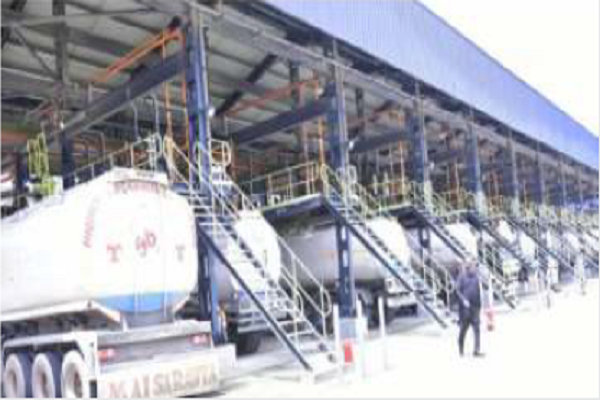
After years of seemingly interminable wait, the Dangote Refinery, the first private refinery in Nigeria and the biggest in the world, came on stream. To the relief of a leading crude oil producing country turned petroleum products importer, a local refinery had come to the rescue. A fleet of trucks at the Dangote Refinery, located in the Ibeju-Lekki area of Lagos State, began lifting Premium Motor Spirit, known as petrol, on Sunday, September 15.
The trucks, belonging to the Nigerian National Petroleum Company Limited, were seen in videos posted on the X handle of the Dangote Group.
The tweet read, “First set of trucks set for loading of PMS at the Dangote Petroleum Refinery.”
Another tweet read, “NNPC begins PMS lifting at the Dangote Petroleum Refinery.”
The $20bn Lekki-based facility is equipped with 86 gantries making it possible to load 86 trucks simultaneously. The Nigeria Television Authority reported that at the start of the process, 10 trucks drove into gantries while their compartments were filled with petrol from a computerised gadget.
The coming on stream of the refinery and loading of the Dangote petrol came with raging controversies over the quality, pricing and distribution of the product. The Federal Government, through the Minister of Finance and the Coordinating Minister of the Economy, Wale Edun, had announced on Friday in Abuja that the NNPC would be the sole buyer of petrol from the refinery, adding that the refinery would commence the distribution of petrol to marketers on Sunday with an initial 25 million litres per day.
This followed the national oil firm’s statement that it was not the exclusive off-taker of products from the Dangote refinery and that the refinery was free to sell its petrol to any marketer.
He said, “I am glad to announce that all agreements have been put in place, and the loading of the first batch of PMS, as already announced by NNPC, will commence on Sunday, September 15, 2024. And from October 1, NNPC will commence the supply of crude oil to the Dangote refinery to be paid in naira.
“In return, Dangote refinery will supply PMS and diesel of equivalent value to the domestic market to be paid in naira. But for now, PMS will only be sold to NNPC. NNPC will then sell to various marketers.”
The National Publicity Secretary, Independent Petroleum Marketers Association of Nigeria, Chinedu Ukadike, said the market should be open for all in line with the willing-buyer and willing-seller commitment earlier made by the corporation.
“It should be open for all in line with the willing-buyer and willing-seller comments made by the NNPC. We are also looking at how to build our logistics and come up with our price,” he stated.
Also, the National President, Petroleum Products Retail Outlets Association of Nigeria, Billy Gillis-Harry, raised concerns over the risks of creating a new domestic monopoly in the oil and gas sector.
Gillis-Harry said, “Right now, even on Saturday, that business (petrol) is going to start rolling out tomorrow (Sunday), we don’t know what the price might be. Nobody has informed us about anything; we are not aware of what the government is doing.
“We don’t know any of the pricing templates yet or the matrix that will bring about the pricing template. We have been asking Dangote or anybody that is in charge of this transaction to be transparent, but somehow, we have not got any of that information.
“We are about to leave NNPC monopoly from importation and now we are also going to have that in a domestic environment, that portends danger for the industry.”
The issue of distribution channels was eventually resolved in favour of an open market distributorship. However, to date, pricing of the product remains a sour issue. Nigerians find it difficult to understand why the price at which the 650,000 barrel-per-day local refinery sells petrol to oil marketers and subsequently, the public remains so high compared to the imported product.
8. Granting of first Nigeria private organization Airstrip Licence to Living Faith

After the tragic death of Herbert Wigwe in February, the next big event of 2024 in the Christian Pentecostal community in Nigeria was the approval granted the Living Faith Church in early October to construct an airstrip in ‘Canaanland.’
It is said to be the first such approval granted by the Federal Government for any private organization.
Bishop David Oyedepo, the Founder and General Overseer of the Church, announced this to members of his congregation at the church’s Tehillah Night Special Edition in Canaanland, Otta, Ogun State. According to him, the airstrip aims to improve transportation for worshippers and visitors, particularly during large events such as Shiloh as they can now move to anywhere from his church premises without having to get to the airport first. The members would now be able to land and park their aircraft at Canaanland.
The General Overseer also revealed that the project would be privately funded by the church, highlighting its commitment to self-reliance and infrastructure development.
Although the exact timeline for construction has not been specified, the church leadership has assured that it would be carried out swiftly and in accordance with all necessary aviation standards.
The announcement elicited mixed reactions from Nigerians. While some congratulated the pastor and the church, others wondered if it was necessary.
An X user with @_klassy tweeting, “If this is legal it means not just himself, many other people can leave from there.
“Does it meet FAA regulations? Environmental and safety regulations? If it does and would help develop the community, then it’s okay. Nor be only pastors dey chop the money. Na just them only una sabi drag pass.”
Another user, @ChrisEjiofor7, commented, “Omo, this is heaven on Earth because there is no comfort great men of God have not enjoyed on Earth now.”
Others expressed worries about the implications for Christianity and societal values. “These pastors have turned the value system of Christianity on its head,” @Stanzigar wrote, adding, “Jesus is the only God who died as a slave. Buddha is from a rich family. Prophet Muhammed’s wife was very rich. Sad!”
However @TheUntamable1 said, “What does it take to have a private airstrip? It’s in my pipeline of dreams too! Congratulations, Papa. I’ve always imagined having my billionaire friends, and I create a mini city for ourselves with a private airstrip as we open up one coastline forest! Oppression!”
“This development should be a way of encouraging Christianity’s effort in restoringl peace and harmony in this nation.”
9. Commissioning of Juhi-2, the Largest Aviation Fuel Depot
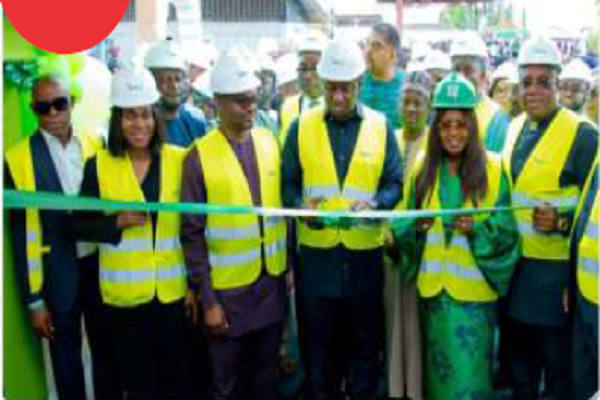
The third major event of 2024 in the aviation industry (after the Air Peace inaugural Lagos-London flight and the grant of Airstrip construction licence to Living Faith Church) was the commissioning of Juhi-2, the single largest aviation fuel depot in Nigeria, on October 17.
Festus Keyamo, the Minister of Aviation and Aerospace Development who commissioned the Joint User Hydrant Installation (JUHI-2), described the project as ‘massive’ in terms of support to the aviation sector.
He said the share audacity by which seven major oil companies came together to set up the project is very commendable. “It is a project that has never been undertaken before in this country, and we continue to encourage such collaboration.
“It is like what you saw in the banking sector many years ago, when banks had to consolidate, and then what we have today are the big banks. This is exactly what is happening here…Coming together has aided this type of massive infrastructure, and it is something we commend to other people to follow,” the minister said.
Olubunmi Kuku, Managing Director, FAAN, said the depot would play a crucial role in supporting operations, improving service delivery, and bolstering national economic growth
Patience Dappa, chairman Juhi 2 Limited, said the commissioning of the JUHI-2 depot is not just the conclusion of an infrastructural project; but testament to the company’s shared belief in excellence and innovation in aviation fuel management.
“As the largest airside jet fuel depot in Nigeria, this facility spans 46,000 square meters and boasts an impressive storage capacity of 15 million liters of Jet A1 fuel.
“However, JUHI-2 is not just about size. It represents operational excellence, safety, and reliability. This facility is equipped with state-of-the-art filtration systems, a jet fuel discharge system capable of loading four bowsers simultaneously, a modern laboratory, and cutting-edge fire prevention measures.
“It is a strategic asset, designed to provide a steady, reliable supply of jet fuel to Murtala Muhammed International Airport (MMIA), MMA1, MMA2, and nearby airbases,” Dappa said.
The depot is a collaborative project by a consortium of companies, including Eterna Plc, Masters Energy Oil & Gas, Techno Oil & Gas, Rahamaniyya Oil & Gas, Ibafon Oil, Quest Oil Group, and First Deep Water Limited.
10. Resuscitation of the Port Harcourt Refinery
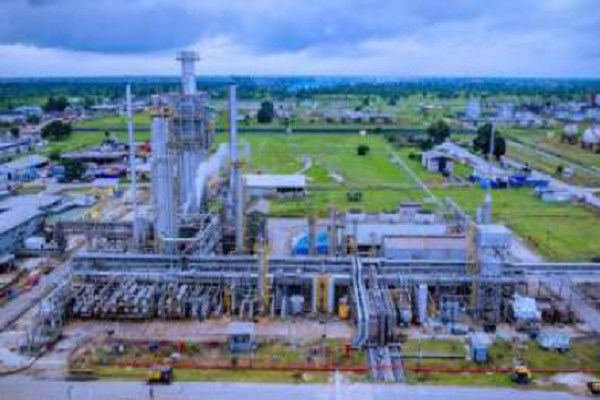
Another milestone event of 2024 in the oil and gas sector (after the commencement of production and sale of petroleum products by Dangote Refinery) was the resuscitation of the moribund Port Harcourt Refinery in late November.
In a press release dated November 26, the Nigerian National Petroleum Company (NNPC) Ltd. said it had fulfilled its pledge of re-streaming the Port Harcourt Refining Company (PHRC), signaling the commencement of crude oil processing from the plant and delivery of petroleum products into the market.
It disclosed that, on Tuesday, trucks had begun loading petroleum products, including Premium Motor Spirit (PMS) or petrol, Automotive Gas Oil (AGO) or diesel and Household Kerosene (HHK) or Kerosene, while other product slates would be dispatched as well.
The Port-Harcourt plant would operate at 60 per cent installed capacity, with 200 trucks loading petroleum products daily, Group Chief Executive Officer of the NNPCL. The resumption of production came after several failed attempts by NNPC to restart the plant.
Speaking during a brief ceremony to mark the commencement of products loading at the Refinery on Tuesday in Port Harcourt, the Group CEO, Mr. Mele Kyari described the commencement of the loadout activities as a monumental achievement for Nigeria which signifies a new era of energy independence and economic growth for the country.
President Bola Ahmed Tinubu who applauded the resumption of production at the refinery said the development would rekindle hope of efficient fuel supply. “President Bola Tinubu extends his heartfelt congratulations to the Nigeria National Petroleum Company Limited (NNPCL) on the successful revitalisation of the Port Harcourt Refinery, marked by the official commencement of petroleum product loading on November 26,” a statement by Presidential Adviser on Information and Strategy, Bayo Onanuga, said.
The President also ordered the reactivation of Warri and Kaduna facilities to enhance effective supply.

